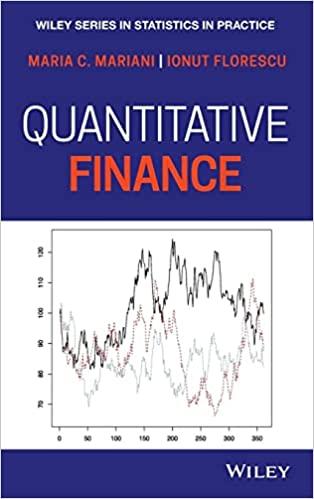Let (Z) be a Brownian motion defined in [0,T]. Given a partition (mathscr{P}) such that (0=t_{0}
Question:
Let \(Z\) be a Brownian motion defined in [0,T]. Given a partition \(\mathscr{P}\) such that \(0=t_{0} \[V_{\mathscr{P}}(Z)=\sum_{j=0}^{n-1}\left(Z\left(t_{j+1}\right)-Z\left(t_{j}\right)\right)^{2}\] and the quadratic variation of \(Z\) as the limit (when it exists) \[V C(Z)=\lim _{|\mathscr{P}| \rightarrow 0} V_{\mathscr{P}}(Z)\] Prove that: (a) \(E\left[\left(Z\left(t_{j+1}\right)-Z\left(t_{j}\right)\right)^{2}\right]=t_{j+1}-t_{j}\). Conclude that \(E\left(V_{\mathscr{P}}(Z)\right)=T\). (b) \(\operatorname{Var}\left[\left(Z\left(t_{j+1}\right)-Z\left(t_{j}\right)\right)^{2}\right]=2\left(t_{j+1}-t_{j}\right)^{2}\), and then \[\operatorname{Var}\left(V_{\mathscr{P}}(Z)\right)=\sum_{j=0}^{n-1} 2\left(t_{j+1}-t_{j}\right)^{2} \rightarrow 0 \quad \text { for }|\mathscr{P}| \rightarrow 0\] (c) Tchebycheff inequality: if \(X\) is an stochastic variable with \(E(X)=\mu\) and \(\operatorname{Var}(X)=\sigma^{2}\), then for all \(\varepsilon>0\) we have that \[P(|X-\mu| \geq \varepsilon) \leq\left(\frac{\sigma}{\varepsilon}\right)^{2}\] Deduce that \(V C(Z)=T\) with probability 1, i.e.:
\[P(|V C(Z)-T| \geq \varepsilon)=0 \]
for all \(\varepsilon>0\). Conclude that with probability \(1, Z\) is not differentiable in any interval \([t, t+a]\).
Step by Step Answer:

Quantitative Finance
ISBN: 9781118629956
1st Edition
Authors: Maria Cristina Mariani, Ionut Florescu





